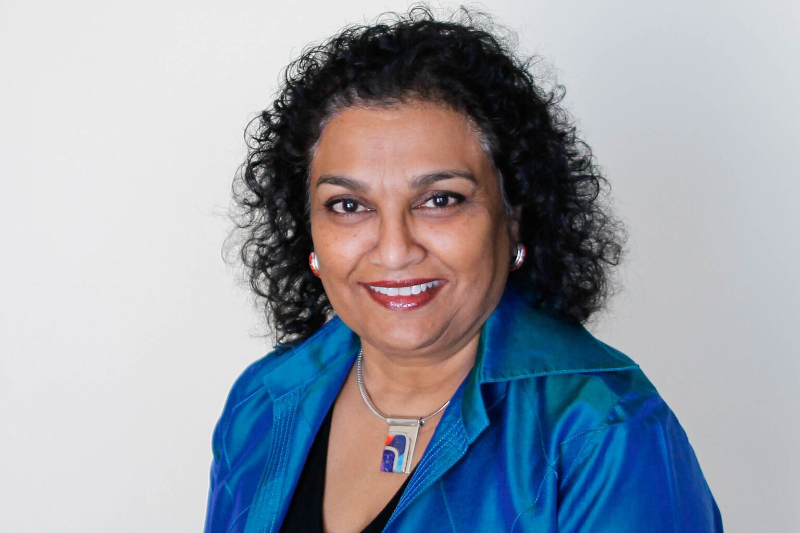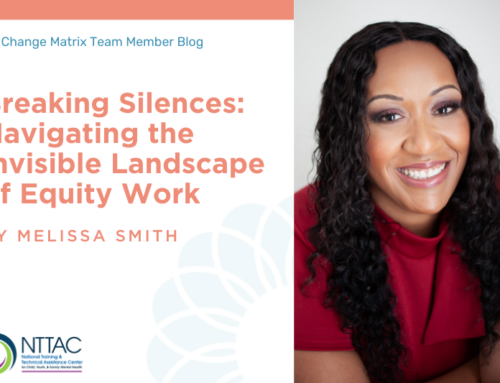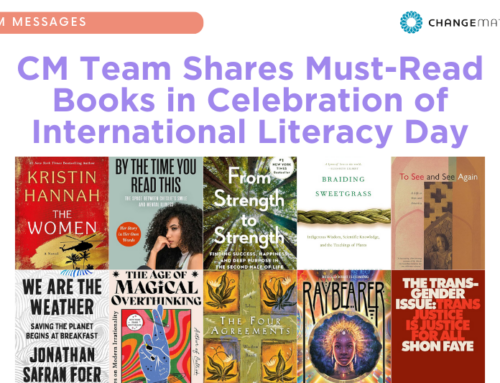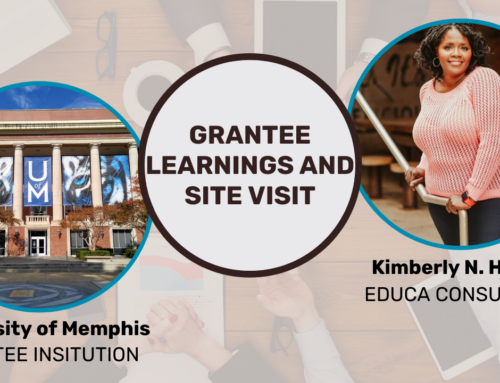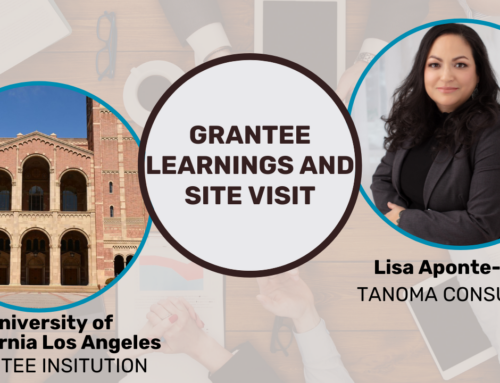About the Series:
Change Matrix has launched a new Podcast Series for 2021, called Equity in Action. Since our inception in 2008, founders Elizabeth Waetzig, Rachele Espiritu, and Suganya Sockalingam have maintained a focus on cultural competence and eliminating disparities. We continue a focus on equity on all of our current projects, continuously look for ways to take action, and look forward to a world where all people get what they need, in ways that work for them, in their communities.
What we Discuss in this Episode:
The foundation of Change Matrix Founding Partner Dr. Suganya Sockalingam’s work is equity. Suganya has an extensive background in cultural and linguistic competence, health inequities and disparities, cross-cultural communication, conflict management, and more. While involved in many projects, she primarily divides her time among the Technical Assistance Resource Center for the Maternal, Infant, and Early Childhood Home Visiting Program (MIECHV), and the Pacific Southwest Mental Health Technology Transfer Center (PS-MHTTC).
Listen as CM Co-Founder Elizabeth Waetzig talks with Suganya about the benefits of coaching and the importance of getting past “limiting beliefs.”
Transcript of the Conversation:
Elizabeth:
You are listening to the Equity in Action podcast, brought to you by Change Matrix. We are sharing the stories of people connected to our organization who have made positive change in equity, with the goal of inspiring you to take action. I get the fantastic privilege of interviewing somebody that’s near and dear to me. She’s not only related to this organization, she is a founder of the organization along with me and Rachele Espiritu.
Suganya Sockalingam has been in my life since the late ‘90s. And one of the reasons that we started having profound conversations is that I was focused on conflict and how conflict showed up in the way that we created systems. And she was focused on culture and the way that culture was often a barrier to accessing positive outcomes and should have been celebrated as a way of healing and building resilience. And so, we started this conversation about how we had to understand culture to understand conflict, because conflict is a cultural experience. And how we had to understand the need for conflict and getting to cultural competence and getting to true equity and inclusion. That conversation has never stopped for us, many, many years later. So, it is my absolute privilege to welcome Suganya Sockalingam into this space. And here we are, Suganya. What do you think about this?
Suganya:
Thank you, Elizabeth. Wow. It brings back memories of 1999 [in] August, when I first joined Georgetown [University]. And you were one of the very few people I met right away because lots of folks were on vacation. But what I do remember is those — we used to call ourselves not water-cooler conversations, but printer conversations because we would meet in front of the printer. And we would start off such an organic conversation about culture and conflict and communication and how all of those together really ties up the work that we do in providing services for people.
Elizabeth:
And you know, I was so grateful because you provided such a gentle landing space for me to screw up and make outrageous statements and really try to find my way when it came to understanding the impact of culture. And I think you should take a lot of credit and bear a lot of responsibility for my education. The desire was there, but I kind of fumbled around a little bit. And I always appreciated that you were a safe place for me to go and we could bounce some ideas around. I’m kind of curious if you could take us a little bit back, because you’ve been doing equity work your whole career and it’s been a remarkable career. Why? Did you want to do that? What started you down that path?
Suganya:
Yeah, and I think I’ve shared this before. I was 13 when civil war broke out in my country. And overnight, people of certain races and ethnicities were no longer considered citizens. They were actually considered second-class citizens. That meant that opportunities for higher education — and I was just going to start high school — higher education, getting good jobs in the government sector, opening your own business, and owning your own business were no longer available to us. And that just seemed so unfair. And I felt so angry that the country that I called paradise was suddenly just taken away from me.
Elizabeth:
You know, it seems so distinct in some ways from the experiences of racism in this country, in the United States. So many people talk about never knowing anything different. Being born the color that they’re born. Being born with the racial background that they have and things are never available. And whereas you had this experience where after enjoying and being an equal and included citizen in your country, it was all of a sudden gone. And so, you knew the before, when it wasn’t like that, and then you experienced what it was after those rights were taken away. So, I can only imagine that sense of anger and bewilderment in some ways that that could happen.
Suganya:
Absolutely. And so much empathy and understanding of the Native American population in this country, who really experienced something very similar. And I think it was maybe even worse because of the genocide and the culture being stripped away from them. I was lucky enough that I could leave and keep my culture, but for asylees, for refugees, and for Native Americans and for many African Americans who were brought into this country, the culture was stripped away.
Elizabeth:
Yeah. It sounds like that was a really powerful experience that shaped your work and the work that’s been going on through state level work and federal level work and to Change Matrix where we try to infuse it into every single thing that we do, which I am tremendously proud of. And I know that you’ve had a big hand in that. So, Suganya, taking you into 2021 right now. You have a pretty extensive view of the landscape that is the United States. I’m wondering if you could offer a couple of things from your perspective that feel really urgent. What feels urgent in our journey to equity right now?
Suganya:
Addressing disparities in our country has been something that the public health sector has been trying to do for over 30 years. And the urgency that we feel right now really has arisen from two major incidences in our country. One is the death of George Floyd, and the other is COVID-19. They both have sort of opened the bandage that we’ve placed on our society and really shows the inequities and the disparities in a way that we’ve never been able to see it before. And I think that that has really raised awareness. It has raised a desire to learn and increase one’s knowledge. And it is an opportunity for all of us to come together. For those of us fighting against inequities and our allies who want to support us [to] become a more equitable society to take action.
Elizabeth:
Yeah. And when you said rip off the Band-Aid, what I thought was we’re seeing the depth and the severity of the wound in a way that we maybe didn’t want to see before. Maybe for some, couldn’t see before. But we’re seeing it. It’s there. It is there for all to see. And you talked about raising awareness and increasing our understanding. And I’ve heard a lot about how we need to take an equity lens. We need to have an equity construct. We need to have a concept. It’s a value. I’ve also heard, though, that in the middle of all that there’s some restlessness. There is a need to act. How do we honor all of the constructs and values and lenses but get to action? So, in thinking about that, if I could ask you, what are the critical actions that you think we need to be taking now?
Suganya:
I think get to the root cause, which we’ve really unearthed now as systemic racism, structural racism that has made it difficult for people to access services, to utilize services, and to even achieve a healthy status. An improved health status. So, my thinking is that now that we know we can’t unlearn, and because we truly have taken the courage to look at the root cause, we now can address it. We can address those systemic [issues] and structures that are in the way of providing services that are equitable, that are culturally resonant and appropriate, and make a difference in people’s lives.
Elizabeth:
Yeah. It’s so much bigger than we need to be kind to one another. It’s so much bigger than we need to be inclusive of individuals. What you’re talking about is a much more complex endeavor, which requires us to think about policy, requires us to think about the origin of some of that structural racism. It requires us also to think about how they’re all interdependent. When you think about housing, when you think about mental health, when you think about education, you can’t actually look at systemic racism one system at a time because they depend on each other a little bit. And so, when I think about that, I start wondering about the leaders that have responsibility for identifying structural racism, identifying the policies that both contribute to that, or stand in the way of ending that. And that’s a really big job. So, I’m just curious what you think about how we need to be focusing on leadership as a way to eliminating the structural racism, which is the ultimate goal.
Suganya:
You know, you and I as such supporters of Ron Heifetz’s concept of adaptive leadership, because we truly know that what we need to address are very complex problems and there are no easy solutions. And I love what he says, that it takes a collective, a group of people and their collective intelligence to learn their way through problems to identify solutions. And so, I truly believe that. I truly believe that if we can come together, and come together from very diverse perspectives, that we could identify ways in which we can make a difference and identify solutions that would be meaningful.
Elizabeth:
Yeah. You’re right. It’s a complex undertaking that requires lots of voices for a long period of time. And sometimes I have this image in my head of lots of leaders standing at a precipice and wondering when we’re going to start going down. When we’re going to start going over and really meaningfully acting to dismantle, to disrupt, to take apart, to examine and to, in some ways, for people who are white to be willing to give up. To be willing to sacrifice their own privilege and power for the collective good. So, I almost answered my own question here, but when you’re standing at this precipice, what gets in our way from moving forward? What’s the thing that’s making us afraid to take on those actions?
Suganya:
Well, it’s always the fear of the unknown, isn’t it? We really don’t know we’re going to be taking a risk. We’re going to be stepping into that void, as Heifetz would say. And we also, I think, have not paid attention to the experienced voices. The lived experience of people who’ve gone through this and know, and may have some of the answers, but we think of them as the lay public, the young people, the people who don’t really have the PhDs and the education, and so how would they come up with the answers? And so, I think that we really have to change the way we think about this and who actually might have some of the solutions. It really calls for us to work with our communities in a deeper and much more authentic way to really seek the expertise there.
Elizabeth:
Yeah. I mean the community expertise. That voice needs to be elevated and supported and maintained. And I think it takes a certain kind of leader with a certain kind of courage to do that. To sort of facilitate that engagement of the voices of lived experience. The communities that have the lived experience. It takes courage, I think, for many leaders to do that. It also takes time and resources that are often not allocated to the work. So, I guess I’m wondering if there are supports and services, or supports mostly, that are particularly useful for those leaders who are in the position of influence and power and could make change, who are feeling for whatever reason reluctant or tentative. What would help those individuals really elevate those voices of the community?
Suganya:
You know, the more I’ve been doing trainings and webinars, the more I’m realizing that we have audiences that are educated, that are knowledgeable, that are experienced. And so, we lose out in not having that opportunity to hear from them. And I know we do this at a Change Matrix is we’re focusing on coaching and allowing and helping people to really use their voice to advocate for change, to dismantle racist infrastructure or policies. I think because we have people who have the expertise, then I think our job is to ask those difficult questions. To ask those challenging questions that will help them to think about it in maybe different ways. And so, I just feel like the coaching that we do has been very relevant.
I just had a conversation with a young leader in mental health and education who, through the coaching sessions, learned that their lived experience was really important to engaging others. And I think that prior to coaching, they may have never have felt that they could do that, but through the process of coaching, they recognized the value they bring by sharing themselves, their expertise, their experiences. And I think that in the last few months in talking to them, I see a very different leader. A leader who’s willing to take risks, who is willing to step into that uncertain space and share their experiences and therefore illicit action from others.
Elizabeth:
Yeah. That’s such a powerful last phrase that you offered, ‘elicit action from others,’ because it sounds like through coaching what we’re doing is emboldening or supporting individual leaders to engage a larger set of voices. And so, we do that by helping them create their own vision for what this could look like. And we do that by helping them really identify the steps to get there and the risks that might come up and how they will approach those and work through them.
And I have to agree that I think coaching is one of the most meaningful things that we do at Change Matrix, particularly for people who are standing on that precipice who know they have a role and know they have influence that are just not quite ready to think about how to do that. And what I’ve experienced is that they want to do it right. And so, until they can figure out that they’re going to do it right, they’re not sure that they’re going to do it. So, I think coaching gives them that, it’s not complete confidence, but it’s a little bit of assurance that it’s worth the risk. It’s worth putting themselves out there. It feels like really important work that we’re doing right now.
Suganya:
You just reminded me of something Brenda, our coach, just shared with me two weeks ago when she said, “What are your limiting beliefs?” And that is, I think, a very critical thing. I think if we can help leaders to identify their limiting belief and then find a way to get past those beliefs, I think we would be able to make the kind of changes that are needed.
Elizabeth:
Yeah. I think you’re right. We just have to help folks step into the void. And I think with coaching, we can absolutely do that. So, Suganya, it’s been my absolute 1,000% pleasure to spend this time with you. And I think those that get to listen to this will learn some things and who knows what will happen?
So, you all have been listening to Equity in Action, and we will have another podcast next month around how a researcher in pediatrics and adolescent intimate partner violence in rural communities has been able to put equity in action in her work. So, we look forward to that. And once again, Suganya, thank you.
Suganya:
You’re so welcome Liz.
Elizabeth:
All right.
